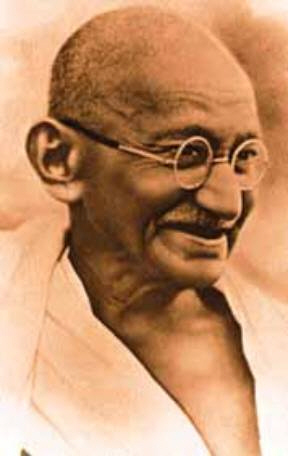
In January of this year a team of us went to Mumbai, India. While in Mumbai, we visited the house that Mahatma Ghandi lived in for some time in that city. That house is now a fascinating museum devoted to the life of that fascinating man. While there I picked up Ghandi’s autobiography. In it, Ghandi talks about his many relations with Christianity. One Christian friend in particular encouraged Ghandi to study the New Testament and consider the truthfulness of Christianity. Ghandi, a Hindu, did precisely that.
Ultimately, Ghandi never became a Christian, in part because of what he saw as the hypocrisy of the Christians he knew. He once said that if Christians in India really followed Jesus, Hinduism would cease to exist in that country. What he meant by that was that Hindus would be so overwhelmed by genuine Christianity, if ever they were actually to encounter it, that they would almost certainly convert. His statement is a pretty condemning indictment of the Christianity that Ghandi encountered, and it challenges us to consider the ways in which our lives either draw people to Christ or repel them from Him.
Even so, Ghandi claimed that there was one part of the teachings of Jesus in particular that he found especially compelling: the Sermon on the Mount. He claimed to love the Sermon on the Mount even though he rejected the theological claims of Christianity about Jesus. Thus, he liked the teachings of Jesus but not the divinity of Jesus or the cross and resurrection of Jesus. It is a distinction that many non-Christians have tried to uphold: the Sermon on the Mount without the Jesus of the New Testament.
As we have been working through the Sermon on the Mount, Ghandi’s (and others’) approach seems more and more absurd to me. In point of fact, if Jesus Christ is not the divine Son of God who laid down His life for His sheep and who came forth victorious from the grave over sin, death, and hell on Easter Sunday morning, then the Sermon on the Mount, far from being a beautiful teaching, is really quite terrifying. For the key to the Sermon on the Mount is not the teachings divorced from the Teacher. Rather, the key is that the Sermon on the Mount is only understandable and livable as Christ indwells us and as we are consistently transformed into His image. Without the cross and the resurrection, the Sermon on the Mount is a message of utter hopelessness, for it is only in and through the perfect righteousness of the Son of God that I can even begin to approach this sermon.
All of this is to say that the sermon cannot be separated from the Sermon Giver. The Sermon on the Mount can only be lived because of the cross on the mount. His eternal teachings can only be grasped because of his empty tomb.
Let us continue to study the Sermon on the Mount, and to live it. That is, let us continue to love Jesus and follow Him.

His actions in life seems to be that of a Christian even though he professed to be a Muslim.. Why did he not act like a great Hindu god of India.. Maybe he did not believe in the miracles of Jesus.
Thank you for your comment Waldine.